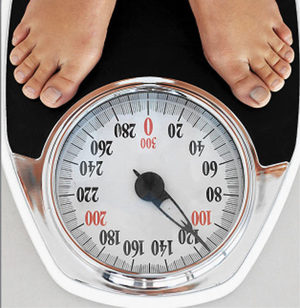
With childhood obesity and its associated health problems rising rapidly, the subject of weight, especially among teens and adolescents, is a very sensitive one in today’s society. Deciding how to approach the issue of weight with your young ones deserves careful attention, because the way in which you handle the subject can have serious and lasting effects. Thankfully, the ADA has come up with some pointers to help ease you into a weighty discussion with your children, or how to respond if your child attempts to discuss it with you on their own.
1. Don’t Talk, Act – If your child is elementary age or younger and you’re concerned with his or her weight, don’t talk about it. Instead, just begin making healthy lifestyle changes as a family. The best thing you can do to get your child on the road to a healthy weight is modeling healthy behaviors. Make it easy for kids to eat smart and be active. Serve regular, balanced meals and snacks and spend time away from the television and computer in favor of fun and active family time.
2. Don’t Play the Blame Game – Never yell, scream, bribe, or threaten children regarding their weight, eating habits, or physical activity. These actions only encourage a negative emotional response surrounding the subject. If you turn these issues into weapons of warfare, the results can be catastrophic. Shame, blame, anger, and resentment are a recipe for failure. The worse children feel about their weight, the more likely they are to overeat, undereat, and develop an unhealthy relationship with food.
3. Form a United Front – As with any other important issue, make sure both parents and other important relatives are on the same page. Mixed messages about food and weight can have unhealthy consequences. Discuss the issue with other authority figures first and decide on a plan together before taking action.
4. Talk with Your Healthcare Provider – If a health professional expresses concerns about your child’s weight, speak with him or her privately. Discuss specific concerns regarding your child’s growth pattern and be sure to bring up any questions that you may have. Be open to suggestions regarding healthy changes to your family’s eating habits and activity levels. Remember, most healthcare professionals want the best for you and your family, so attempt to listen even if some things are difficult to hear;
5. Seek Advice – For kids and teens, check out local programs and professionals (such as Family Food) that specialize in youth. Look for a registered dietitian that specializes in pediatric weight management. Many hospitals and clinics sponsor comprehensive programs with education and activities for both children and family members. Better yet, some of these options, such as free visits with a registered dietitian, may be covered by your health insurance plan.
6. Think Big – The focus should be health, not weight. Often times we are so focused on appearance that we forget what it means to truly be healthy. If your family starts eating better and moving more, your child may “grow into” their weight as their height increases. Compliment your children on successful and beneficial lifestyle behaviors rather than the loss of a few pounds.
However you choose to approach the issue of weight with your children, be mindful of both their physical and emotional well-being. To really make an impact, you should focus your energy on being healthy and active as a family (that means you, too) and maintaining those changes over the long term.
For more information on eating healthfully and being active as a family, constructing a nutritious meal plan for your child, or finding a registered dietitian in your area, take a look at the ADA website atwww.eatright.org. Be sure to check out our Services page or contact us by phone or e-mail to learn how we can help! You can also find us on Facebook or Twitter!
Facebook: http://www.facebook.com/pages/Family-Food/178786105530247
Twitter: http://twitter.com/#!/Familyfoodllc

